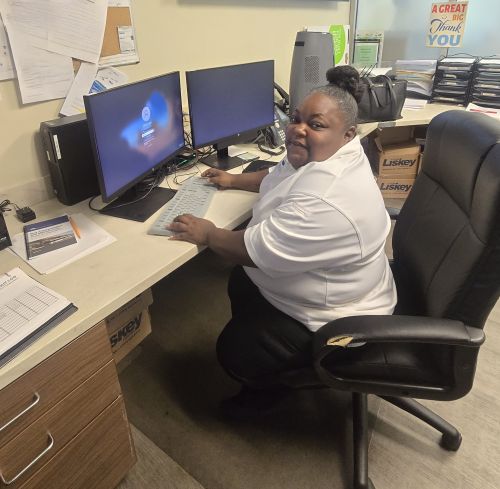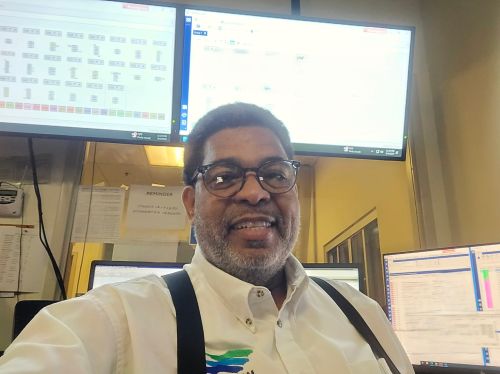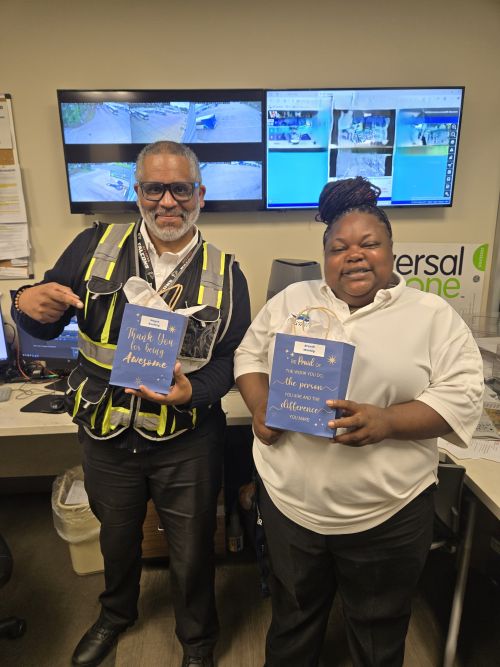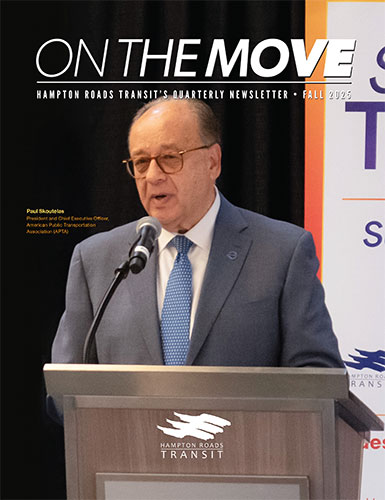Here’s What It Takes to Be a Bus Transportation Supervisor
If public transit agencies live and die by their schedules, then Operations is the heart and soul of the agency. Hampton Roads Transit has dozens of bus transportation supervisors working around the clock across the Southside and Peninsula. Together, they’re responsible for more than 400 bus operators who keep buses – and people – moving.
Bus Transportation Supervisor Brandi Manley is among them. She’s been a supervisor for nearly three years after first joining HRT as a bus operator six years ago. Manley was looking for stability and an opportunity to advance her career.
“I wanted to better myself and be able to move up in the company,” Manley said.
Manley had prior management experience but wasn’t sure she wanted to take on that role again. She was approached by a manager — twice – before finally taking the leap and applying for the supervisor position.
“I’m glad I experienced being a bus operator first,” Manley said. “It gave me a better understanding when I became a supervisor because I can look at things from both sides.”
There’s more to bus operators than simply driving a bus. They’re called on to be customer service representatives, collection agents, and counselors. Often working six days a week.
“People have real life going on. They have families. They have children that they have to go and take care of.” Sometimes, Manley says, “they just want to be heard and to know they aren’t alone.”
“It makes [operators] feel better,” Manley said, “because they know they have someone they can talk to who will understand their frustration.”
Bus Transportation Supervisors need more than good communication skills, although that’s a must. They also need to be good leaders with the ability to motivate their team.
“Someone who can come in and promote internal growth, a positive work environment, strong leadership, and coaching qualities,” explained Jonathan Greene, Senior Manager of Bus Transportation.

‘It gets intense’
According to Greene, bus transportation supervisors generally rotate through a handful of assignments, including administrative tasks such as taking sick calls, interviewing trainee candidates, and finding operators to fill open work.
“From the outside looking in, you think all they do is sit back there pushing buttons,” Manley said. “But it gets intense.”
When operators call out sick, plans change, and that means being able to think quickly to cover routes.
One of the most challenging parts of the job, according to Manley, is ensuring employees follow all rules, regulations and standards. It could be an “honest mistake,” but still, Manley says, she must put her feelings aside and take the appropriate action.
Supervisors may also find themselves working at one of the dispatch windows on the Southside or Peninsula. A hub of activity, this is where bus operators check in each day to receive their assignments. Supervisors are responsible for ensuring that operators are fit for duty and leave with the necessary equipment.
Field supervisors are tasked with responding to incidents and checking in on new operators. Greene says it’s important to let them know they have support if they need it.
“If they have any questions, someone is there to help them out,” Greene said.
Supervisors on the Southside are responsible for monitoring the Radio Control Center (RCC) – answering calls from operators regarding route detours, mechanical problems, customer issues and more. RCC is staffed with two supervisors. One takes calls for the Southside while another handles the Peninsula.
“You never know what kind of call you’re going to get,” Greene said. “You’ve got to be able to think fast.”

Serving as a counselor
That’s a sentiment echoed by Carl Rodgers, a bus operator-turned-supervisor. Like Manley, he was approached by a supervisor about applying for the position and was promoted about two years ago.
“Working as an operator before becoming a supervisor gave me the situational awareness to understand what operators are up against,” Rodgers said. Now, he works overnight in the RCC, where he says “all kinds of calls are coming in” from newer bus operators with less experience. “Some situations can be unnerving and unsettling,” Rodgers said. “You’ve got to guide them along, take the fear out, be a little bit of a counselor.”

In moments like that, Rodgers says he always thinks back to the people who helped him along when he was a new operator. Greene calls his ability to relate “a bonus” and says Rodgers is “highly respected by the bus operators because he was one of them.”
Rodgers and Manley both agree that the work is rewarding. Being able to get a new bus operator through a difficult day is gratifying. To be part of an operator’s growth is fulfilling.
A couple of years ago, a struggling bus operator received some words of encouragement from Manley. “I didn’t think she’d be here very long,” Manley recalled. But she recently ran into the operator, who thanked her for her support. “Now she’s flourishing.”

Opportunities for growth
Manley says there’s a misconception that being part of management makes you unapproachable. She’s working to dispel that myth by venturing into the breakroom, sitting down, and talking to operators as often as she can.
Rodgers offers this advice: Don’t just become a supervisor for the sake of being a supervisor.
“When you come over to the supervisor role, there’s a lot of work and responsibilities waiting for you,” Rodgers said. “Come over because you have something to offer.”
When challenges arise, Rodgers reminds operators to look for opportunities and points to the many operators who have been with HRT for 20 years or more, telling new operators that whatever challenges they face, “they are not insurmountable.”
Manley suggests reading up on the job description and ensuring it’s something you want to do, as it can become “intense.” She went on to say, “The job is what you make it.”
Greene also has advice for bus operators wanting to move to management – “Don’t take the job for granted. You never know who sees the potential in you.”
Something that both supervisors, Manley and Rodgers, can attest to.
Greene, who also started as a bus operator, says he’s a “living testament” to HRT’s strong culture of promoting from within. He says the opportunity is there for anyone who wants it -for the right reasons. According to Greene, “the sky’s the limit if you want it within this organization.”





